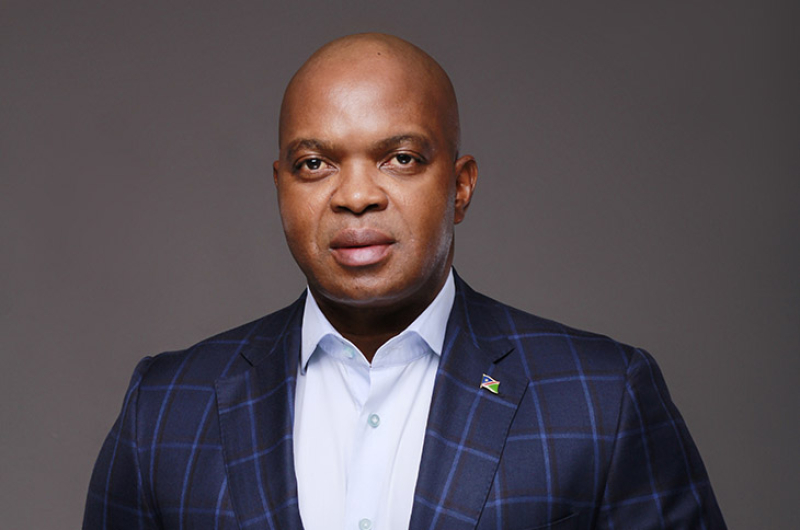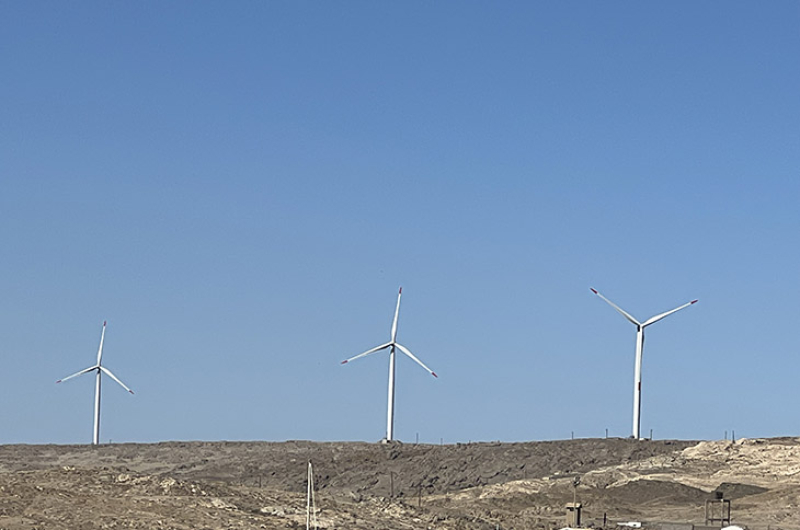 Call 061 290 8000
Call 061 290 8000 Click to mail us
Click to mail us FAQs
FAQs

DBN
The Bank announces the appointment of Nicky Katapa Mutenda as the new Chief Financial Officer (CFO) with effect from December 18, 2023, for a period of 5 years. Nicky’ appointment follows a meticulous selection process conducted by a panel of six distinguished individuals drawn from the DBN Board and by external experts.
Commenting on Nicky’ appointment, John Steytler, DBN CEO, expressed unwavering confidence in Nicky as a capable candidate with the ability to contribute to the success and growth of the Bank.
Nicky is a seasoned finance professional with over eleven years of banking sector experience. He holds professional designations such as Chartered Accountant (South Africa) CA (SA), Chartered Accountant (Namibia) CA (NAM), Chartered Certified Accountant (FCCA), and ACI Financial Markets Association Certified Market Professional (ACICMP).
Additionally, Nicky obtained a Postgraduate Diploma in Accountancy from Rhodes University and a Bachelor's Degree in Commerce from the University of Namibia. His educational accomplishments also include the ACI Diploma (Merit) and the ACI Dealing Certificate (Distinction).
Nicky has been an integral part of the Development Bank of Namibia (DBN) since May 2017 when he took on a position as the bank's first Manager: Treasury. During his tenure, he successfully established a fully-fledged treasury function at DBN. His dedication and expertise led to his promotion to the position of Treasurer / Senior Manager: Treasury in August 2021 and, after just two years, he has now ascended to the position of Chief Financial Officer and Chief Treasurer. Prior to joining DBN, Nicky held the position of Treasury Finance Manager at First National Bank of Namibia Limited. Between 2013 and 2015, he successfully undertook his Chartered Accountancy Training Outside Public Practice (TOPP) articles at Absa Bank Limited in Johannesburg. While employed at Absa, Nicky gained experience in diverse areas, including Exchange Traded Funds (ETFs), CIB Loan Portfolio Product Control, and Group Internal Audit.
Beyond his role at DBN, Nicky actively contributes to the Namibian corporate landscape. He serves as an Independent Non-Executive Director of PowerCom and UNAM Foundation. Furthermore, he serves as an External Committee Member on the Board Investment Committee of the Motor Vehicle Accident (MVA) Fund and the Finance & Audit Committee of the Namibia Institute of Corporate Governance (NICG) respectively.
The Board and the Bank wish Nicky the very best in his new role.
The Development Bank of Namibia (DBN) has announced its participation in the Bank of Namibia (BoN) SME Economic Recovery Loans scheme. Participation brings the number of schemes on offer by DBN to two. The other scheme offered by the Bank is the KfW Bankengruppe (KfW) scheme.
Highlighting the differences between the schemes, DBN Head of Marketing and Corporate Communication, Jerome Mutumba, says the BoN scheme is of a longer duration of 7 years, and the interest rate floats at prime -0.5%. On the other hand, the KfW scheme is of short duration, with repayment to conclude by 31 October 2025. The KfW scheme offers a fixed interest rate of 5.925% with the first 12 months interest free.
Talking about terms for the schemes, Mutumba says that businesses that qualify for participation should be clear on the time that they will require to repay the loan amount. In the event of loans not being repaid in the periods specified in terms of the respective schemes, loans will be restructured to adhere to DBN’s terms of lending.
He referred potential borrowers to the Bank’s webpage, www.dbn.com.na/recovery, for a detailed comparison of the schemes. He also added that information would be available at the Bank’s branches in Windhoek, Ongwediva, Rundu and Walvis Bay.
On the topic of qualification for the schemes, Mutumba stressed that the decision to finance applicants was solely at the discretion of the Bank, and subject to standards and requirements established in the application form for finance available at the Bank’s branches or on its website.
He went on to say that the BoN scheme will be available solely to existing DBN borrowers and said that each applicant for the scheme should speak to their individual portfolio manager. On the other hand, he said that the KfW Scheme is available to new borrowers with an existing business track record.
He urged enterprises to interrogate their need for the relief schemes. The schemes, he said, place additional debt obligations on borrowers, which makes it important for each borrower to assess the benefit of and returns to participation. It is vital that enterprises be able to use the schemes to recover and grow.
The Bank, Mutumba concluded, was put in place to support larger enterprises and SMEs with clear development impact. The implementation of these schemes requires beneficiaries of the loans to ensure that they further their goals and prolong their sustainability in the medium to long term.
Development Bank of Namibia (DBN) has launched its inaugural Sustainable Finance Framework (SFF).
The Framework is aligned with the four core components of the International Capital Market Association’s (ICMA) Green Bond Principles 2021, Social Bond Principles 2021, Sustainability Bond Guidelines 2021 as well as the Loan Market Association’s (LMA) Green Loan Principles 2023 and Social Loan Principles 2023.
Download the relevant documentation, here...
The Framework has seven green categories which aim to achieve the environmental objectives of climate change mitigation, sustainable use and protection of water and marine resources, protection and restoration of biodiversity and ecosystems and four social categories which aim to achieve the social objectives of raising living standards, increasing social inclusion, improving access to essential healthcare and education.
DBN has obtained a Second Party Opinion (SPO) from S&P Global Ratings (the SPO report is available at www.spglobal.com/ratings) which assessed that the Framework is aligned with the category principles.
The Framework received a strong alignment score across the Use of Proceeds section given a clear description of eligible categories and sustainability objectives, and the reporting section, given DBN will report both the expected and achieved environmental and social impacts of financed projects via the engagement of an external reviewer.
DBN CEO Martin Inkumbi said – as a bank – DBN has a strong ambition to become the go-to ESG bank in Namibia.
The launch of the board-approved Sustainable Finance Framework (SFF) is an important milestone for the Bank’s sustainability journey. The launch is in advance of a planned debut sustainable bond issuance in the second half of 2023, Inkumbi added.
The SFF will serve as a reference for all green, social or sustainability bonds, loans and other debt instruments issued by DBN in the local or international capital markets to fund the bank’s investments in eligible ESG (environmental, social and governance) projects.





